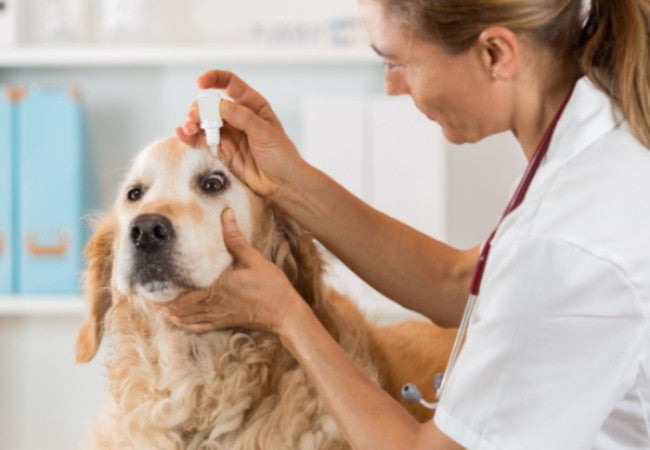Dog Eye Discharge 2025: Vet Verified Causes, Cleaning Guide & When to Visit the Vet 🐾

In this article
Dog Eye Discharge 2025: Vet Verified Causes, Cleaning Guide & When to Visit the Vet 🐾
By Dr. Duncan Houston BVSc
🔍 What Is Eye Discharge?
Eye discharge is a mix of tears, mucus, oil, debris, and skin cells. Normal “eye boogers” are common—but when the discharge is thick or unusual, it often signals an eye issue.
🟦 Types & What They Mean
- Clear/watery (epiphora): Caused by tear overflow from irritation, allergies, blocked tear ducts, or breed-based tear drainage issues.
- White/gray mucus: Often due to dry eye (KCS), where tear production decreases and mucus compensates.
- Yellow/green discharge: Indicates possible infection—bacterial, viral, or fungal; often with redness or discomfort.
⚠️ Other Warning Signs
- Redness, squinting, swelling, and pawing at the eye.
- Cloudiness—could suggest corneal ulcers, cataracts, or glaucoma.
- Pain responses—blepharospasm, rubbing against furniture.
- Visible third eyelid or bulging eye—cherry eye, glaucoma, trauma.
🎯 Who’s More Prone?
Brachycephalic breeds (Pugs, Bulldogs, Shih Tzu, Cocker Spaniels), tear-stain breeds, and swimmers are at higher risk for eye discharge and related issues.
🔬 Diagnosing the Cause
- Ophthalmic exam with an otoscope/ophthalmoscope.
- Schirmer tear test for dry eye.
- Fluorescein stain to check for ulcers.
- Possible cytology or culture if infection or chronic discharge.
🛠️ Treatment Overview
- Gentle cleaning with warm, damp cloth daily.
- Topical antibiotics/antifungals or steroids for infection/inflammation.
- Artificial tears/cyclosporine/tacrolimus for KCS.
- Address eyelid abnormalities like entropion or distichiasis surgically if needed.
- Manage underlying allergies or systemic conditions.
📅 Cleaning & Monitoring at Home
| Step | Action |
|---|---|
| 1 | Wash hands, use a separate clean cloth per eye |
| 2 | Soak the cloth with warm water or saline |
| 3 | Gently wipe from the inner to the outer corner |
| 4 | Apply prescribed medication, then reward |
| 5 | Note color/amount daily; call vet if worsening |
🧸 Ask A Vet,
- 🩺 Ask A Vet: Expert triage, treatment recommendations, ongoing follow-up care.
🎯 Final Message
Regularly cleaning your dog’s eyes and recognizing discharge types—whether clear, mucus, or pus—can help catch serious issues early. Prompt veterinary care and species-specific treatment protect eye health and comfort. For personalized help, use Ask A Vet. A clear gaze means a happy, healthy pup 🐶❤.
— Dr Duncan Houston, BVSc
Need guidance on your dog’s eye health? Visit AskAVet.com or download the Ask A Vet app for expert vet support anytime.






